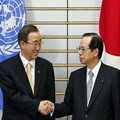 聯合國秘書長潘基文(Ban Ki-moon)29日於昔日簽署《京都議定書》的日本京都登高呼籲,國際社會必須展現強烈的決心,在2009年底前達成新協議,確立任何對抗氣候變遷的可能措施。
聯合國秘書長潘基文(Ban Ki-moon)29日於昔日簽署《京都議定書》的日本京都登高呼籲,國際社會必須展現強烈的決心,在2009年底前達成新協議,確立任何對抗氣候變遷的可能措施。
潘基文表示,他選擇京都作為訪問的第一站,有其象徵上的政治性訊息,因為此地正是1997年通過《京都議定書》之地。「我們掌有資源又握有技術,相信政治意願正是目前所缺少的臨門一腳。只要我們將全球政治意願聯合起來,我有信心這些危機對全人類而言並非全然無解」。
潘基文認為,十年前在此批准的議定書,象徵著國際社會在抑制溫室氣體排放量方面,歷史性與決定性的第一步。潘基文強調,隨著《京都議定書》第一階段性任務將於2012年屆滿,而又鑒於2007年12月於印尼峇里島舉行的聯合國氣候變遷高峰會,已訂定出2009年12月為目標日程,因此我們必須在此限之內,訂立並簽署新協定。
全球暖化是個龐雜的挑戰,並非單一國家或社會中的產業部門可以獨力解決,而是各國與產業合作且貢獻所能。潘基文號召所有二氧化碳主要排放國,在2009年新的協議中,設定更有野心與企圖心之目標。
日本首相福田康夫(Yasuo Fukuda)9日曾於日本記者俱樂部的演說中主張,「為了人類未來新的一代,我們有必要大幅轉動國家的輪舵,朝向低碳社會發展」。「為了達成目標,我們必須在2050年以前,將全球二氧化碳排放量減半。而這項減量目標,正是日本向世界倡議『Cool Earth推進構想』(Cool Earth Programme)的骨幹」。潘基文在對福田康夫宣示的評論中指出,「這正是我們想從已開發國家身上見識的領導風範,勇於承擔和履行肩上沈重的責任與義務」。
潘基文表示,未來八大工業國在商討實質措施,應對三項急迫且複雜交疊的全球性挑戰時,將考慮讓日本擔任領導者的地位。此三項挑戰包括:全球糧食危機、氣候變遷與全球對抗貧窮的目標,統稱為聯合國千禧年發展目標,預定於2015年以前達成。
潘基文在此行中會見30多位日本企業領導者,談話內容同樣圍繞著全球氣候變遷。在會談中,潘基文對這些日本的企業資深幹部表示,在解決諸如氣候變遷等具迫切性議題上,絕對少不得民間部門支持與合作的力量。
The world must galvanize its will and reach a new agreement on measures to fight climate change by the end of 2009, said UN Secretary-General Ban Ki-moon Sunday in the Japanese city where the Kyoto Protocol was finalized.
Ban said he chose Kyoto as his first stop because he wants to "send out a very symbolic political message from the place where the Kyoto Protocol was adopted more than 10 years ago." "We have resources; we have technologies. I think what is missing is largely political will. If we have united political will, I am sure we will be able to overcome these crises," the secretary-general said.
Ban said the 1997 protocol was a historic and crucial first step by the international community to curb greenhouse gas emissions. With the first commitment period of the Kyoto Protocol ending in 2012, the secretary-general stressed that a new agreement must be adopted by December 2009, a target date already agreed by governments at the UN climate summit in Bali, Indonesia last December.
He said climate change is too big and complex a challenge for any country or sector of society to address alone; each country and each sector can and must contribute. The secretary-general called on all major emitters to set ambitious targets which he said were essential to conclude the deal in 2009.
On June 9, Prime Minister Yasuo Fukuda said in a speech at the Japan Press Club, "We must greatly shift the country's helm towards a low-carbon society for the sake of future generations." "For this we must halve global CO2 emissions by the year 2050. This reduction target forms the crux of the 'Cool Earth Programme' which Japan has proposed to the world. I aim to have this goal shared by the G8 and other major economies," the prime minister said. Commenting on this announcement, Ban said, "This is the kind of leadership by example we need from developed countries to fulfil the larger share of responsibility they bear."
The secretary-general said he would count on Japan's leadership at the G-8 summit to come up with concrete measures to address three pressing, interrelated challenges - the global food crisis, climate change, and the race to reach global anti-poverty targets called the Millennium Development Goals by the deadline of 2015.
Climate change was the focus when Ban met Japanese business leaders in Tokyo later in the day. Speaking to about 30 senior executives of leading Japanese corporations, the secretary-general said support and cooperation of the private sector is vitally important to addressing pressing issues such as climate change.
全文及圖片詳見:ENS



